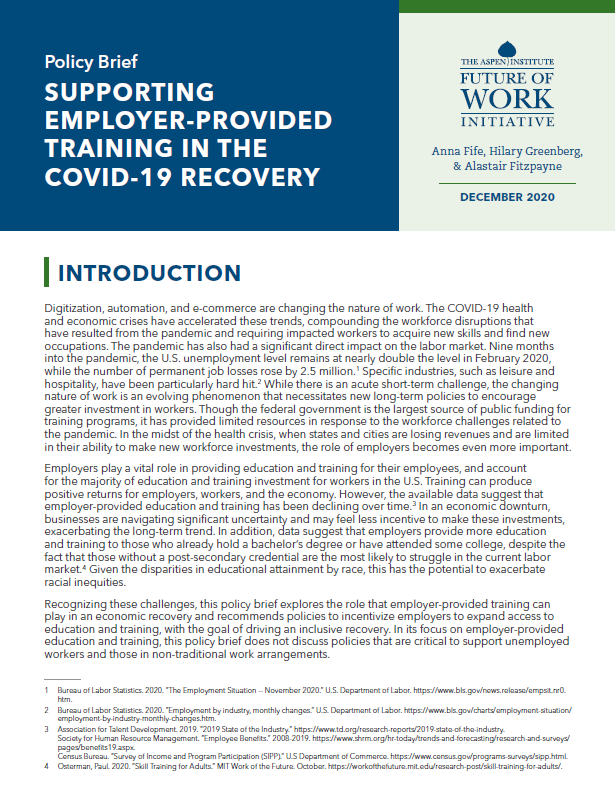Introduction
Digitization, automation, and e-commerce are changing the nature of work. The COVID-19 health and economic crises have accelerated these trends, compounding the workforce disruptions that have resulted from the pandemic and requiring impacted workers to acquire new skills and find new occupations. The pandemic has also had a significant direct impact on the labor market. Nine months into the pandemic, the U.S. unemployment level remains at nearly double the level in February 2020, while the number of permanent job losses rose by 2.5 million. Specific industries, such as leisure and hospitality, have been particularly hard hit. While there is an acute short-term challenge, the changing nature of work is an evolving phenomenon that necessitates new long-term policies to encourage greater investment in workers. Though the federal government is the largest source of public funding for training programs, it has provided limited resources in response to the workforce challenges related to the pandemic. In the midst of the health crisis, when states and cities are losing revenues and are limited in their ability to make new workforce investments, the role of employers becomes even more important.
Employers play a vital role in providing education and training for their employees, and account for the majority of education and training investment for workers in the U.S. Training can produce positive returns for employers, workers, and the economy. However, the available data suggest that employer-provided education and training has been declining over time. In an economic downturn, businesses are navigating significant uncertainty and may feel less incentive to make these investments, exacerbating the long-term trend. In addition, data suggest that employers provide more education and training to those who already hold a bachelor’s degree or have attended some college, despite the fact that those without a post-secondary credential are the most likely to struggle in the current labor market. Given the disparities in educational attainment by race, this has the potential to exacerbate racial inequities.
Recognizing these challenges, this policy brief explores the role that employer-provided training can play in an economic recovery and recommends policies to incentivize employers to expand access to education and training, with the goal of driving an inclusive recovery. In its focus on employer-provided education and training, this policy brief does not discuss policies that are critical to support unemployed workers and those in non-traditional work arrangements.
While funding for education and training is an important component of an economic recovery strategy, other policies are needed to support workers and enable them to obtain new skills. These include policies to help to meet essential needs, such as income support, health care, housing assistance, food security, paid leave, and child care, as well as policies that help overcome common barriers to training opportunities, such as support for internet connectivity and transportation. Expanding access to high-quality training must also be considered in the broader context of promoting economic stability and pathways to opportunity. In addition to the availability of jobs, policymakers and industry leaders should consider the quality of jobs. The creation and availability of good jobs—jobs that offer a living wage, access to benefits, security and safety in the workplace, a stable and predictable schedule, and opportunities for advancement—are a key part of the path to financial security for workers and their families.
The Future of Work Initiative is grateful to Lumina Foundation for providing funding for this policy brief. The statements, views, and conclusions expressed in this publication are solely the responsibility of the authors.


